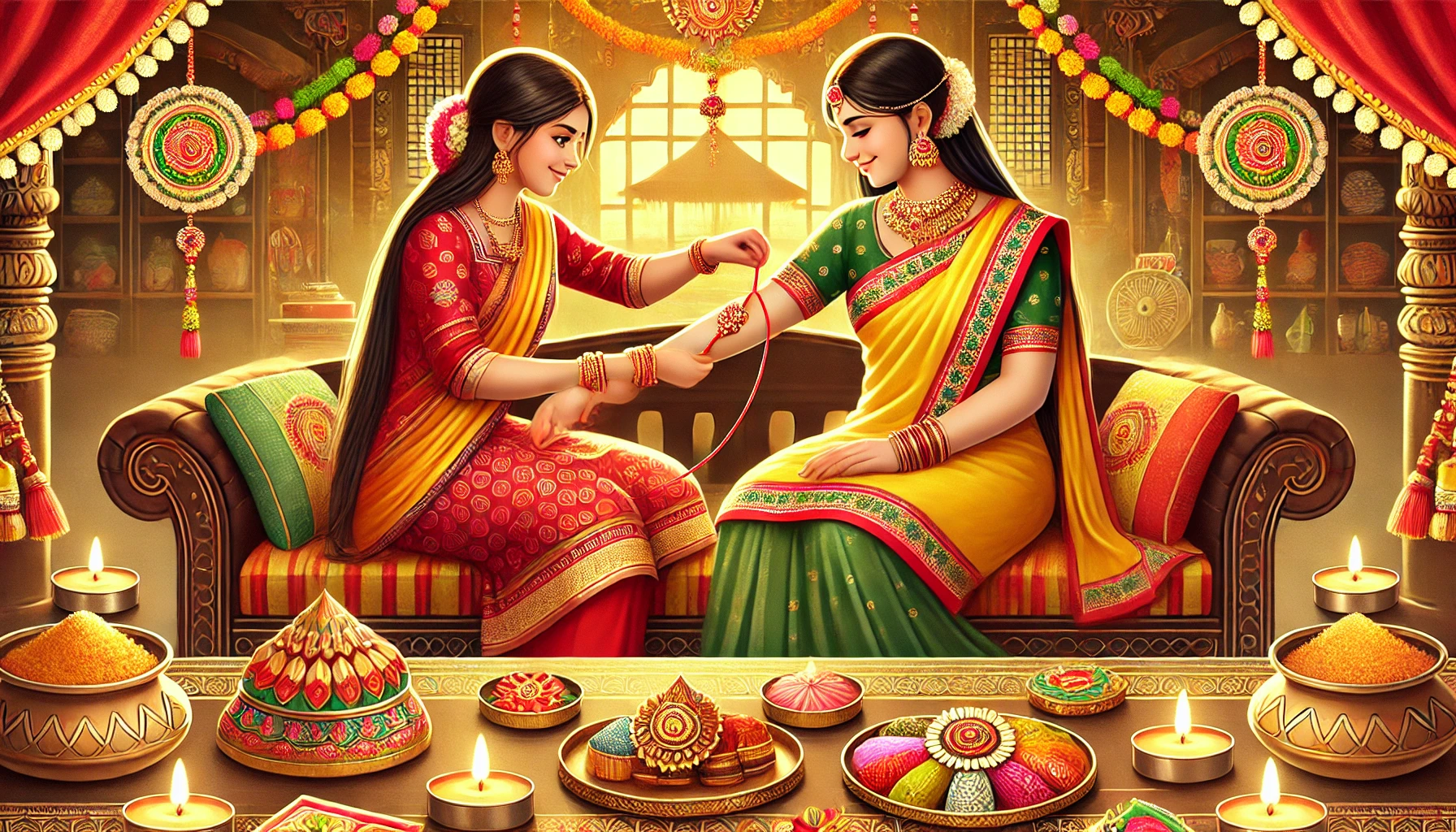
- This event has passed.
Raksha Bandhan
August 19

Raksha Bandhan, celebrated predominantly in India, is a festival symbolizing the deep bond between brothers and sisters. This unique celebration involves the tying of a rakhi—a sacred thread—by a sister on her brother’s wrist as a mark of affection and protection. The festival transcends biological relationships, fostering a spirit of harmony and familial ties across communities.
The significance of Raksha Bandhan stretches beyond the simple act of tying a rakhi. It serves as a reminder of the enduring relationships that are central to Indian culture and values. With its roots embedded in historical and mythical stories, the day is not only about protection but also about rekindling family ties in our increasingly busy lives.
History and Meaning
The origins of Raksha Bandhan can be traced back to ancient India, where it was not just a familial tradition but also a political tool. Historical records and myths recount the use of rakhi in the royal courts where queens would send rakhis to neighboring rulers as a gesture of brotherhood and peace. This tradition underscored the rakhi’s role as a mark of trust and respect.
In its spiritual context, Raksha Bandhan is linked to several legends in Hindu mythology, such as the story of Lord Krishna and Draupadi, where Draupadi tied a piece of cloth on Krishna’s wrist to stop bleeding, prompting his vow to protect her. This illustrates the deep spiritual dimensions of the festival, highlighting themes of loyalty, protection, and divine bonds.
Traditions and Rituals
Raksha Bandhan is marked by specific rituals which have been preserved through generations. The day begins with sisters and brothers dressing in their finest clothes. The sister prepares a thali with the rakhi, sweets, roli, and rice. The ceremony involves the sister applying a tilak on her brother’s forehead, tying the rakhi, and offering sweets. This ritual not only strengthens the bond but also reaffirms the brother’s lifelong vow to protect his sister.
The reciprocal gesture involves the brother giving gifts to the sister, which might include clothes, jewelry, or other tokens of love. This exchange solidifies the mutual respect and affection between siblings, transcending the mere ceremonial aspect of the festival.
Modern Celebration of the Day
In contemporary times, Raksha Bandhan has adapted to fit the globalized world. It’s common for siblings who live far apart to send rakhis and gifts through mail or digitally. Social media platforms are abuzz with messages and photos of celebrations, making the festival a global event that connects the Indian diaspora.
The modern celebration also sees variations in how the day is observed across different regions of India. In some parts, it coincides with local festivals or is marked by cultural performances, making it a broader community celebration beyond the confines of individual families.
10 Congratulations and Wishes
- “May this rakhi bring you everything you desire and everything you dream of. May success accompany you in every step that you take. Have a blessed Raksha Bandhan!”
- “On this special day, I pray for your happiness and well-being. May our bond of love continue to grow stronger with each passing year.”
- “Happy Raksha Bandhan to my protective shield and my forever friend. Here’s to more laughter and shared secrets!”
- “As we tie this rakhi, let it symbolize the strength of our love and the bond we share. Happy Raksha Bandhan, dear brother!”
- “May this rakhi bring all the blessings, love, and care for you. The warmth of our relationship continues to grow every year.”
- “Wishing you a Raksha Bandhan filled with sweet moments and happy memories to cherish forever!”
- “To my amazing sister, who is also my best friend. Let’s continue to support and protect each other, today and always.”
- “No matter where we are in the world, this rakhi will always keep us close. Wishing you a very Happy Raksha Bandhan!”
- “Here’s to a lifelong bond of friendship and love that only grows stronger with each rakhi. Have a wonderful day!”
- “On Raksha Bandhan, I want to thank you for being my partner in crime and my confidant. Wishing you a day as beautiful as you are.”
10 Unusual Facts
- Raksha Bandhan is also celebrated by Jain communities, where priests give ceremonial threads to the devotees.
- This festival has historical references during the Mughal period, promoting peace between Hindu and Muslim communities.
- Raksha Bandhan is recognized and celebrated in different forms in countries like Nepal, Mauritius, and Pakistan.
- The world’s longest rakhi was made in India and was over 5000 feet long.
- The festival has inspired various social campaigns in India, including those promoting the protection of women.
- Raksha Bandhan sometimes coincides with Independence Day in India, adding to its national significance.
- The rakhi ceremony has been performed in space by Indian astronauts.
- Bollywood has numerous songs dedicated to celebrating this brother-sister bond.
- Raksha Bandhan has evolved to include bhabhi (sister-in-law) in some Indian communities, where the sister ties rakhi to both her brother and his wife.
- The festival is mentioned in ancient texts like the Bhavishya Purana and Mahabharata, highlighting its deep cultural roots.
10 Frequently Asked Questions
Q1: What is the best time to tie rakhi on Raksha Bandhan?
A1: The best time to tie rakhi is during the Aparahna time, which is late afternoon according to Hindu division of the day.
Q2: Can Raksha Bandhan be celebrated between people who are not biologically related?
A2: Absolutely! Raksha Bandhan celebrates a bond of protection and love, extending beyond biological relationships. It is often celebrated among close friends and cousins.
Q3: What does the rakhi thread symbolize?
A3: The rakhi thread symbolizes love, care, and the promise of protection between siblings.
Q4: Are there any specific colors or designs important for rakhi?
A4: While there are no specific rules, traditionally, rakhis are bright and colorful, often adorned with symbols of love and care like hearts or flowers.
Q5: What are some traditional gifts given on Raksha Bandhan?
A5: Traditional gifts include sweets, clothes, and jewelry. Nowadays, personalized gifts like photo frames, custom jewelry, and tech gadgets are also popular.
Q6: How has Raksha Bandhan changed in modern times?
A6: With the advent of digital communication, siblings can now send virtual rakhis and gifts. The core values of love and protection, however, remain the same.
Q7: Is Raksha Bandhan a public holiday in India?
A7: Yes, Raksha Bandhan is observed as a public holiday in several parts of India, allowing families to celebrate together.
Q8: Can Raksha Bandhan be celebrated by sisters tying rakhis to each other?
A8: Yes, it’s all about celebrating the protective bond, regardless of gender. Sisters can tie rakhis to each other, especially in the absence of a brother.
Q9: What are some eco-friendly ways to celebrate Raksha Bandhan?
A9: Eco-friendly celebrations include using biodegradable rakhis, organic sweets, and gifts that contribute to sustainable practices.
Q10: How do non-Hindu communities view Raksha Bandhan?
A10: Many non-Hindu communities appreciate and sometimes participate in Raksha Bandhan due to its universal themes of love and protection.
Raksha Bandhan holds a mirror to the values of love, care, and mutual respect that are central to human relationships. As we evolve, the ways we celebrate may change, but the essence of Raksha Bandhan remains steadfast—a celebration of an unbreakable bond between siblings. This festival not only strengthens familial bonds but also fosters social harmony, making it a day of great importance in the cultural tapestry of India.
Why This Day Is Important
Raksha Bandhan serves as a poignant reminder of the intrinsic value of family and societal harmony. It encourages a societal structure where men are responsible for the women in their lives, promoting a sense of security and mutual respect. This festival is a celebration of the sanctity of familial bonds and plays a crucial role in maintaining the social fabric of the communities.
Author’s Opinion
In my view, Raksha Bandhan is much more than a traditional festival; it is a vital cultural practice that nurtures the values of respect, affection, and responsibility. It highlights the role of traditions in modern society, serving as an anchor in our fast-paced lives and reminding us of the importance of family and community in our personal growth and societal development.




